2018-2019年英语外研版小学四年级上册be going to与will的区别
外研版四年级上册英语We’re--going--to--visit---Hainan.22页PPT

1、战鼓一响,法律无声。——英国 2、任何法律的根本;不,不成文法本 身就是 讲道理 ……法 律,也 ----即 明示道 理。— —爱·科 克
3、法律是最保险的头盔。——爱·科 克 4、一个国家如果纲纪不正,其国风一 定颓败 。—— 塞内加 5、法律不能使人人平等,但是在法律 面前人 人是平 等的。 ——波 洛克
56、书不仅是生活,而且是现在、过 去和未 来文化 生活的 源泉。 ——库 法耶夫 57、生命不可能有两次,但许多人连一 次也不 善于度 过。— —吕凯 特 58、问渠哪得清如许,为有源头活水来 。—— 朱熹 59、我的努力求学没有得到别的好处, 只不过 是愈来 愈发觉 自己的 无知。 ——笛 卡儿
拉
60、生活的道路一旦选定,就要勇敢地 走到底 ,决不 回头。 ——左
外研版(三起)四上Module 8《Unit 1 We are going to visit Hai

We’re going to visit Hainan .
我们计划去海南旅游。
China
The UK
英国
China
The UK
英国
China , China , I’m from China .
我来自中国。
The UK , the UK , I’m from the UK .
2、I can remember the key sentences. 能记住重点句子。
(看图、听录音,注意语音、语调)
3
A. 8 o’clock
4
B. 5 o’clock
Read after the tape!
跟录音,读课文。 (尤其注意刚才你所标注出的单词或句子。)
Please read in pairs.
sock 短袜
from 来自 tomorrow 明天 o’clock 点钟
plane
飞机
I can read the key words .
点钟
tomorrow
visit
get up
swimsuit
大海
from
比一比,看哪组能 顺利到达顶点。
Learning aims:
1、I can read and understand the text. 准确、流利地朗读并理解课文。
We’re going to visit Hainan.
We’re going to go by plane.
I’m going to Swim.
这一 样个 的人 人所 才受 有的 学教 问育 。超
过 了 自 己 的 智 力 ,
You made my day!
外研版四年级英语上册We’re-going-to-visit-Hainan教案
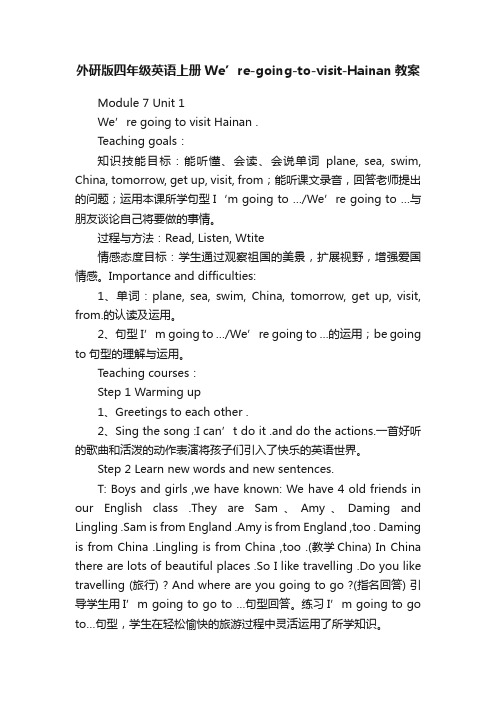
外研版四年级英语上册We’re-going-to-visit-Hainan教案Module 7 Unit 1We’re going to visit Hainan .Teaching goals:知识技能目标:能听懂、会读、会说单词plane, sea, swim, China, tomorrow, get up, visit, from;能听课文录音,回答老师提出的问题;运用本课所学句型I‘m going to …/We’re going to …与朋友谈论自己将要做的事情。
过程与方法:Read, Listen, Wtite情感态度目标:学生通过观察祖国的美景,扩展视野,增强爱国情感。
Importance and difficulties:1、单词:plane, sea, swim, China, tomorrow, get up, visit, from.的认读及运用。
2、句型I’m going to …/We’re going to …的运用;be going to句型的理解与运用。
Teaching courses:Step 1 Warming up1、Greetings to each other .2、Sing the song :I can’t do it .and do the actions.一首好听的歌曲和活泼的动作表演将孩子们引入了快乐的英语世界。
Step 2 Learn new words and new sentences.T: Boys and girls ,we have known: We have 4 old friends in our English class .They are Sam、Amy、Daming and Lingling .Sam is from England .Amy is from England ,too . Daming is from China .Lingling is from China ,too .(教学China) In China there are lots of beautiful places .So I like travelling .Do you like travelling (旅行) ? And where are you going to go ?(指名回答) 引导学生用I’m going to go to …句型回答。
新外研版四年级英语上册Unit 1 We are going to Hainan 课件 2

Activities Swim (活动) visit museum
Hello,W? hat´s your name?
Where are you from? I'm from China
I´m Sam. I´m from the UK.
Talk to your partner
Homework:
1.Read the text fluently.熟读课文。
2.Do Exercise 3 and Exercise 5 on your Exercise Books. 做配套练习册第三题和第五题。
3.Write 3 things you are going to do tomorrow. 4.写出三件你明天打算做的事情。
4.我们打算去踢足球。 We are going to play football
5.我打算吃一些米饭和水果。 I am going to eat some rice and fruit
假设你在跟一个朋友谈论暑假的旅行
句型提示: Hello! I’m …What’s your name? I’m from … I’m going to …
Module 8 Unit 1
We are going to visit Hainan
我们打算参观海南
Lead in
go to the park go to schooll
go by train go by bike
I'm going to Hainan
Visit Get up From Sock Swimsuit Tomorrow sea plane
参观 起床 来自 短袜 泳衣 明天 大海 飞机
外研版(三起)-英语-四年级上册-Unit1 be going to与will的区别

小学-英语-上册-打印版
be going to与will的区别
be going to与will两者都可表示将要发生的事、将要去做某事,但它们有如下几点区别:
1. be going to 表示近期、眼下就要发生的事情,will 表示的将来时间则较远一些,如:
He is going to write a letter tonight.
He will write a book one day.
2. be going to 表示根据主观判断将来肯定发生的事情,will表示客观上将来势必发生的事情。
He is seriously ill. He is going to die.
He will be twenty years old.
3. be going to 含有“计划,准备”的意思,而will 则没有这个意思,如:
She is going to lend us her book.
He will be here in half an hour.
4.在有条件从句的主句中,一般不用be going to, 而多用will, 如:
If any beasts comes at you, I'll stay with you and help you。
小学-英语-上册-打印版。
外研社英语四年级上册《wearegoingtogotohainan》教案.doc

外研社英语四年级上册《we are going to go to hainan》教案本课使用的教材是外研社小学英语四年级上册Module 7 Unit1 We are going to go to Hainan.活动一的内容,课文以对话的形式,讲述了一家人准备去海南旅行。
课文学习be going to句型。
学情分析:学生学过的主要语言知识有be going to句型、there be结构、一般过去时及有关问路、乘机的功能语言等。
通过本综合复习单元的学习,让学生在旅行中的不同场景运用be going to句型。
激发学生热爱祖国的大好河山和中国的民族文化。
学生学习的方式有:①个体探究。
在完成较简单的任务时以个体探究为主,鼓励学生有独立自主的思维意识。
②协作学习。
当面对难度较大的学习任务时鼓励学生采取小组合作的方式,这是因为协作学习更方便英语的交流和体验,有利于培养学生与他人合作的能力,同时信息差异也更能激燃起学生的创新火花。
教学目标:1、知识目标(1)使用 be going to讲述自己的计划和即将发生的事情。
(2 )能听懂、会说、会读、会写词汇:children, tomorrow, from ,China, swim, sea, by plane .2、技能目标能听懂、会说、会读句型:Were going to Im from3、情感态度带领学生了解一些关于旅游的知识。
培养学生主动用英语与他人交流,能积极与他人合作,共同参与,合作完成学习任务。
通过对本课的学习,让学生学会从小就要有计划地做事情,合理的安排时间。
教学重点:词汇: tomorrow, by plane ,swim, sea, from .句型: Were going to go to Hainan tomorrow.教学难点:plane, swim, sea .教学过程:一、 Revision1.Greeting2.T :Lets say and do the actions。
2018-2019年英语外研版小学四年级上册Unit 1 Were going to go to Hai

Unit 1 We’re going to go to Hainan. 教学案一、学习目标1.学习句型We are going to …tomorrow.2.激发学生热爱祖国的大好山河。
3.培养学生使用be going to 讲述自己的计划和即将发生的事情。
二、预习学案1.听录音,找出单词及词组:children/ tomorrow/ by plane/ get up/ from China/ swim in the sea/ visit2 .记录be going to 句型。
三、导学案(一)交流热身,预习导入1.唱歌曲I can’t do it.2.复习以前学习过的动词及词组:run/ ride/ play/ swim…(二)小组合作,自主学习1.教师出示当天的日历,指着的日期说‚Today is …‛并出示新的一月份的挂历对学生说:‛Our winter holiday is going to be in January. And I am going to go to Hainan in winter holiday.‛2.学生谈论What are they going to do at this weekend ?3.出示中国地图,指着沈阳告诉学生 I am going to go to the zoo in Shenyang this weekend. So I am going to get up at 6o’clock in the morning.(三)归纳探究,词汇点拨1.课件显示Smart一家:Look! This is Smart’s family. They like traveling, too. OK! Let’s listen and look. Where are they going to go tomorrow? (明天他们将要去哪里?) (1)Listen ,point and underline the new words .(2)Listen and repeat, then answer some questions.2. Point and say.(四)反馈,总结评价1. Chant2. Activity: 四人一小组,制定寒假旅游计划,完成下表:S1: I’m goi ng to go to .S2: I’m going to go to .S3: I’m going to go to .S4: I’m going to go to .通过讨论后,小组最后决定:We are going to go to .四、课堂检测从II栏中找出与I栏相对应的答语( ) 1. Can I have some bread? A. No, I can’t.( ) 2. Where is the park? B. She ‘s writing a letter.( ) 3. What is grandma doing? C. Go straight on then turn left.( ) 4. Can you run fast? D. I am going to go to England.( ) 5. Where are you going? E. Yes, you can..五、课后作业1.和同学分角色朗读课文。
小学英语外研新标准四年级上册Module8We'regoingtovisitHainan
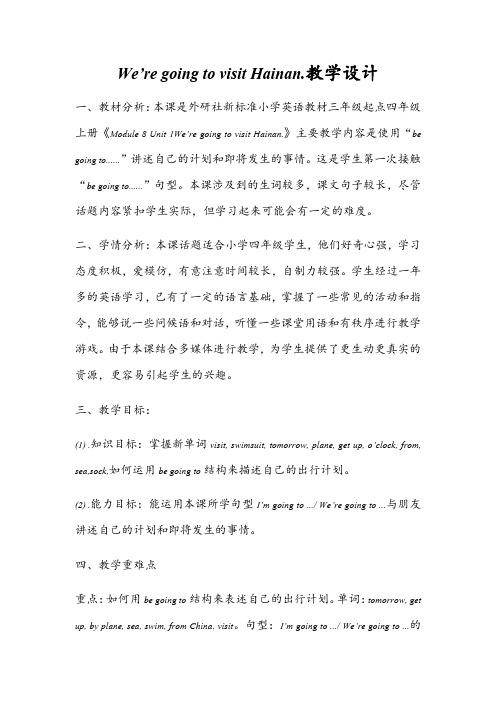
We’re going to visit Hainan.教学设计一、教材分析:本课是外研社新标准小学英语教材三年级起点四年级上册《Module 8 Unit 1We’re going to visit Hainan.》主要教学内容是使用“be going to......”讲述自己的计划和即将发生的事情。
这是学生第一次接触“be going to......”句型。
本课涉及到的生词较多,课文句子较长,尽管话题内容紧扣学生实际,但学习起来可能会有一定的难度。
二、学情分析:本课话题适合小学四年级学生,他们好奇心强,学习态度积极,爱模仿,有意注意时间较长,自制力较强。
学生经过一年多的英语学习,已有了一定的语言基础,掌握了一些常见的活动和指令,能够说一些问候语和对话,听懂一些课堂用语和有秩序进行教学游戏。
由于本课结合多媒体进行教学,为学生提供了更生动更真实的资源,更容易引起学生的兴趣。
三、教学目标:(1).知识目标:掌握新单词visit, swimsuit, tomorrow, plane, get up, o’clock, from, sea,sock,如何运用be going to结构来描述自己的出行计划。
(2).能力目标:能运用本课所学句型I’m going to .../ We’re going to ...与朋友讲述自己的计划和即将发生的事情。
四、教学重难点重点:如何用be going to结构来表述自己的出行计划。
单词:tomorrow, get up, by plane, sea, swim, from China, visit。
句型:I’m going to .../ We’re going to ...的运用。
难点:be going to...句型的理解与运用。
五、教学过程Step 1: Warming up(热身)1.Greetings.T: Good morning, boys and girls. I’m Tina.S:......T: How are you today?S:......T:Look, before class, Let’s chant together.2.Let’s chant.Swim, swim, swim fast. I can swim fast.Run, run, run fast. I can run fast.Row, row, row a boat. I can row a boat.Ride, ride, ride a bike. I can ride a bike.Fly, fly, fly a kite. I can fly a kite.(设计理念:四年级的学生比较活泼好动,通过chant能让学生很快的进入到英语学习课堂中,也为本堂课的教学做铺垫。
外研版(三起)四年级上册英语教案:Module 9 unit 2 I’m going to do t

外研版(三起)四年级上册英语教案:Module 9 Unit 2 I’mgoing to do the high jump (3)教学目标1.学习并掌握本课时的词汇:high jump, long jump, run, jump, throw, climb, swim, ride, skate, play the piano, paint, sing, dance, play chess;2.能够运用be going to结构表达自己的未来计划;3.能够听懂教师所提问的问题并正确作出回答;4.能够根据所学的语言知识互相交流。
教学重点1.理解和掌握本课的重点词汇及句型;2.正确运用be going to结构表述自己未来计划。
教学难点1.学生们对于高跳、跳远、投掷等运动项目可能存在的陌生感和不了解的地方;2.学生们对于be going to的语法结构可能不够熟悉,需要教师重新进行更加明确的体验和讲解。
教学准备课件、录音机、小黑板、教材、绘本、教师所选音乐。
教学过程Step 1 Revision•以回顾上一节课的主体内容为入口,让学生更加容易接受本节课的知识点。
•回顾部分可以将所学习的知识用图片或描述形式呈现在黑板或课件上。
•确保学生对于上节课所学内容的掌握与理解程度。
Step 2 Presentation and Practice1.教师首先将be going to的相关语法点简要介绍,例如:如何运用begoing to来表达自己的未来计划。
2.让学生们跟着教师一起学习和掌握本课所涉及的重点词汇,并在老师的带领下指导学生如何正确地使用这些词汇。
例如,run, jump, throw, climb, swim, ride, skate, play the piano, paint, sing, dance, play chess等。
3.学生们可以尝试着举出一些自己未来的计划,然后用be going to结构来表达,同时也可以交换对方的计划来进行对话。
外研版四年级英语上册各单元知识点汇总

外研版四年级英语上册各单元知识点汇总Module 1 ◎模块知识必备清单重点词汇straight 直地; 直线地left 左边; 向左; 左边的right 右边; 向右; 右边的lost 迷路的live 居住No. (number 的缩写)第……号street 大街, 街道supermarket 超市beside 在……旁边, 在……附近cinema 电影院station 车站train 火车hill 小山near 接近, 临近house 房屋重点短语go straight on 直着走excuse me 对不起, 打扰一下turn left 向左转turn right 向右转next to 紧靠……旁边, 贴近so much 十分, 非常重点句型1 Excuse me. 打扰一下。
解读: 该句子常用于问路、请教或插话之前, 用来引起对方的注意。
2 Where’s No. 2 Park Street, please? 请问公园大街2 号在哪儿?解读: 句型“Where’s (+the)+ 地点名词, please?”用来问路。
3 Turn left. /Go straight on. /Turn right. 向左转。
/ 直着走。
/ 向右转。
解读: 当有人向你问路时, 可用Turn left. /Go straight on. /Turn right. 来回答。
4 —Thank you so much! 非常感谢你!—You’re welcome! 不客气!解读: 常用的感谢语: Thanks. 谢谢。
/Thank you (very much/so much)! (非常)感谢你(们)!常用的感谢语答语: Not at all. 不用谢。
/That’s all right. 不用谢; 不客气。
/You’re welcome! 不客气!5 It’s at the station. 它在车站。
解读: “It’s+ 介词短语.”用于描述某物所在的位置。
Module 9(知识清单)四年级英语上册期末核心考点(外研版三起)
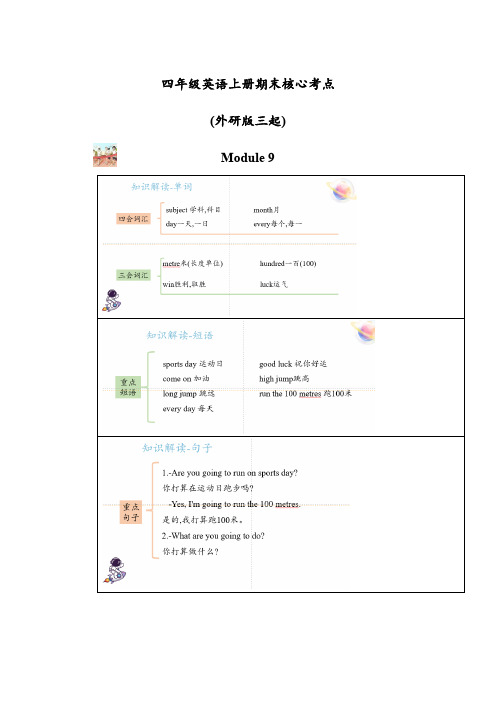
四年级英语上册期末核心考点(外研版三起)Module 9知识解读(导图)重难精讲一、“be going to 结构的一般疑问句”。
课文例句:I’m going to do the high jump.我打算跳高。
I’m going to swim.我打算去游泳。
句型分析:be going to 结构的一般疑问句;Be 动词+主语+ going to 十动词原形(+其他)?”肯定回答为“Yes,主语+ be动词.”;否定回答为“No,主语+ be 动词+ not,”。
例题分析:___C____ you going to skip?A. CanB.IsC. Are二、“一般将来时的特殊疑问句句型结构。
”课文例句:Are you going to run on sports day?你打算在运动日跑步吗?Are you going to swim on sports day?你打算在运动日游泳吗?句型分析:特殊疑问词+ be 动词十主语十going to 十动词原形(十其他)?特殊疑问词一般是what 或where,句末用问号,要根据实际情况来回答。
例题分析:1.__What______ ( What/Where) are you going to do?2.__Where______ ( What/Where) are you going to run?三、“How about ...?”课文例句:I'm going to fish tomorrow. How about you?我明天打算去钓鱼。
你怎么样?句型解析:How about ...?”是口语中使用较多的客套用语,意思是“....·怎么样”,常用来向对方提出建议、请求,或征求对方的看法或意见,很少单独使用。
它和“What about...?”用法一样。
例题分析:-___C____ are you going to do?-I'm going to run.A/ B. How C. What易错点拨例题1:I'm going to run __________sports day.A.atB. onC.in【点拨】: on sports day 表示运动会,句意表达为我将会在运动会跑步,A 选项at+小地点;C 选项in+大地点、月份,因此选B 。
2018-2019年英语外研版小学四年级上册《Module 9 unit 1 Are you going (2)
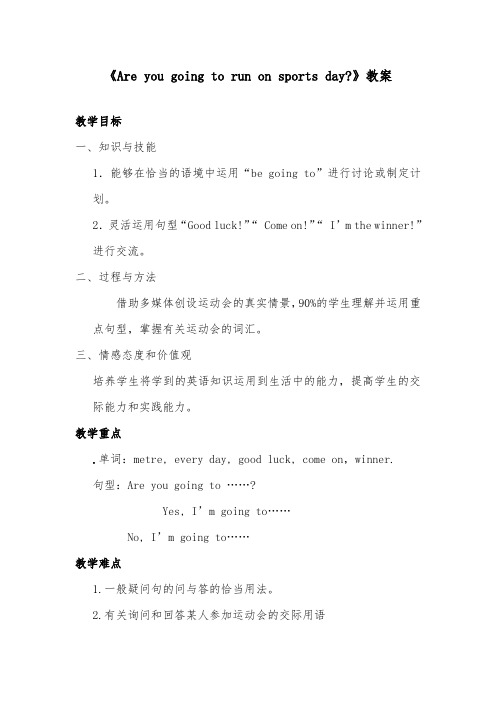
《Are you going to run on sports day?》教案教学目标一、知识与技能1.能够在恰当的语境中运用“be going to”进行讨论或制定计划。
2.灵活运用句型“Good luck!”“ Come on!”“ I’m the winner!”进行交流。
二、过程与方法借助多媒体创设运动会的真实情景,90%的学生理解并运用重点句型,掌握有关运动会的词汇。
三、情感态度和价值观培养学生将学到的英语知识运用到生活中的能力,提高学生的交际能力和实践能力。
教学重点.单词:metre, every day, good luck, come on,winner.句型:Are you going to ……?Yes, I’m going to……No, I’m going to……教学难点1.一般疑问句的问与答的恰当用法。
2.有关询问和回答某人参加运动会的交际用语教学方法小组合作互动学习角色扮演课前准备多媒体点读笔卡片课时安排2课时教学过程一、导入新课讲新课之前,同学们先读一遍单词,使用“手机”录音,收集学生典型成果,在“授课”系统中展示。
Step 1. Warm-upPlay a game.I say you do.run, jump, swim, dance, play football, play basketball, read a book, fly a kite, ride a bike, take pictures.【设计意图】热身环节让学生复习以前学过的动词或动词短语,调动学生的学习兴趣,为本课的学习打下基础。
二、新课学习tep 2. Lead-in1.呈现运动会图片,学习短语sports day,引出课题Are you going to run on sports day?以及肯定,否定回答,并进行口头练习。
2.Chant:Are you going to……?引领学生跟随音乐一起chant。
2018-2019年英语外研版小学四年级上册Module 9 unit 1 Are you going

小学一般将来时讲解与练习一、一般将来时的定义:一般将来时表示在将来时间将要发生的动作或存在的状态,与表示将来的时间连用。
tomorrow, next day(week, month, year…),soon, the day after tomorrow(后天)等。
如:She will visit Shanghai tomorrow.二、一般将来时的构成(一)一般将来时有两种构成形式: 1.主语+shall/will+do 2. 主语+ be going to + do 在表示“打算到某地去时”由于谓语动词go与going重复,一般可以只说be going to a place。
三、一般将来时的用法(一)1.主语+shall/will+do (will 可用于所有人称,shall只用于第一人称I和we) 这种结构不是表示自己的打算、意图或计划,而是表示未来的事实或对将来的预测等如:No one will do heavy work. Roberts will do everything for us.2.主语+ be going to + do这种结构常用来表达自己打算做某事、计划做某事或者有意做某事。
注意:be 动词要与主语的人称和数一致,如: I am going to do some reading tomorrow. He is going to have a piano lesson next week. We are going to have a party this Friday. (二)通常情况下will 和 be going to能互换,但是be going to 与will 用法的也是有点区别的 1. 只用will不用be going to的情况: ①表示对未来时间与年龄的推测时,如: Tomorrow will be Monday. She will be thirteen next year. ②表示必然发生时,如: Fish will die without water. People willdie if all green plants die. 2.只用be going to而不用will的情况如果表示已有迹象表明在不久的将来要发生的事情时,如: Look at those black clouds, It’s going to rain. (三)某些动词如:go/come/leave/start/begin/arrive等,它们的现在进行时可以表示将来时,如: They are leaving for Shanghai tomorrow. My brother is coming here soon. 四、一般将来时的句式变换肯定句:主语+shall/will+do 主语+ be going to + do 否定句:主语+shall/will+not+do(will not 可缩写成won’t)主语+ be+ not+ going to +do 一般疑问句:shall/will+主语+ do be+主语+going to+do 特殊疑问句:疑问词+ shall/will+主语+do。
新外研版四年级英语上册be going to的一般疑问句
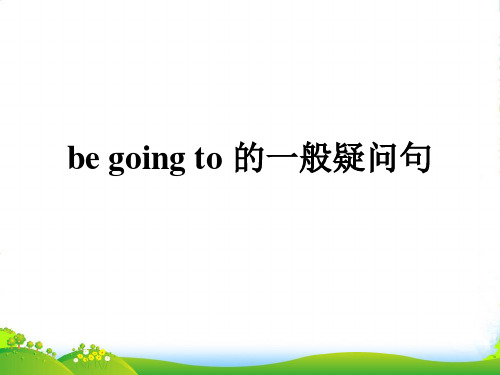
be going to一般疑问句的构成: 把be (am, is, are)放到句首,在句末加问号就 构成了一般疑问句。其答语为:Yes, 主语 +am/is/are./No, 主语+isn’t/aren’t./No, I’m not. 不过I am…在改为一般疑问句时常常改为“Are you…?”
谢谢观赏
You made my day!
我们,还在路上……
•不习惯读书进修的人,常会自满于现状,觉得再没有什么事情需要学习,于是他们不进则退。经验丰富的人读书用两只眼睛,一只眼睛看到纸面上的话,另 一眼睛看到纸的背面。2022年4月1日星期五2022/4/12022/4/12022/4/1 •书籍是屹立在时间的汪洋大海中的灯塔。2022年4月2022/4/12022/4/12022/4/14/1/2022 •正确的略读可使人用很少的时间接触大量的文献,并挑选出有意义的部分。2022/4/12022/4/1April 1, 2022 •书籍是屹立在时间的汪洋大海ng to see the car factory next week. 一般疑问句及其回答 A: Are they going to see the car factory next week? B: Yes, they are./ No they aren’t.
- 1、下载文档前请自行甄别文档内容的完整性,平台不提供额外的编辑、内容补充、找答案等附加服务。
- 2、"仅部分预览"的文档,不可在线预览部分如存在完整性等问题,可反馈申请退款(可完整预览的文档不适用该条件!)。
- 3、如文档侵犯您的权益,请联系客服反馈,我们会尽快为您处理(人工客服工作时间:9:00-18:30)。
be going to与will的区别
be going to与will两者都可表示将要发生的事、将要去做某事,但它们有如下几点区别:
1. be going to 表示近期、眼下就要发生的事情,will 表示的将来时间则较远一些,如:
He is going to write a letter tonight.
He will write a book one day.
2. be going to 表示根据主观判断将来肯定发生的事情,will表示客观上将来势必发生的事情。
He is seriously ill. He is going to die.
He will be twenty years old.
3. be going to 含有“计划,准备”的意思,而 will 则没有这个意思,如:
She is going to lend us her book.
He will be here in half an hour.
4.在有条件从句的主句中,一般不用 be going to, 而多用will, 如:If any beasts comes at you, I'll stay with you and help you。
